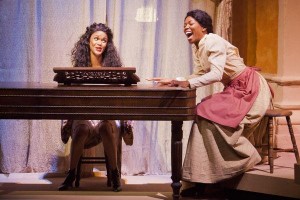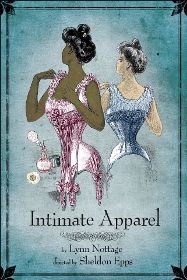 BEST TO LOOK AT THE QUILT AS A WHOLE, NOT THE INDIVIDUAL ELEMENTS
BEST TO LOOK AT THE QUILT AS A WHOLE, NOT THE INDIVIDUAL ELEMENTS
Intimate Apparel is a delicate but persuasive play about Esther (Vanessa Williams), a gifted black seamstress in 1905 who begins a series of missives with George (David St. Louis), a strapping, fetching, and younger Caribbean man working on the Panama Canal. The plain Esther is illiterate, so she receives assistance in crafting her letters from two of her clients: Mrs. Van Buren (Angel Reda), an unfulfilled but wealthy white socialite, and Mayme (Kristy Johnson), a gin-swilling high-class call girl. While the letters take on a romantic nature, Esther finds herself increasingly attracted to Mr. Marks (Adam J. Smith), a Hasidic retailer of fine fabrics, but their feelings can never be effectuated, so she decides to marry George, sight unseen.
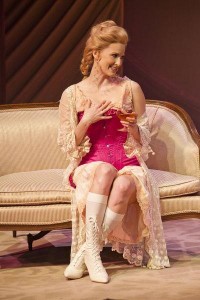 Lynn Nottage’s plays are filled with commentary, but she does so in a lyrical and intelligent fashion. Her examination of race, society, and class’”in an era during which many of the freedoms we take for granted were taboo’”sheds light on the universal themes of loneliness, fitting in, and getting ahead. There is daintiness to the plot, making the play nearly conflict-free in the first act, but that seems wholly appropriate given the strictures of turn-of-the-century America. Once George comes to live with Esther in Act Two, the drama heats up, but under the direction of Sheldon Epps, the evening remains a lovely, involving, and languid affair, when it has the opportunity to be a much more moving piece as well.
Lynn Nottage’s plays are filled with commentary, but she does so in a lyrical and intelligent fashion. Her examination of race, society, and class’”in an era during which many of the freedoms we take for granted were taboo’”sheds light on the universal themes of loneliness, fitting in, and getting ahead. There is daintiness to the plot, making the play nearly conflict-free in the first act, but that seems wholly appropriate given the strictures of turn-of-the-century America. Once George comes to live with Esther in Act Two, the drama heats up, but under the direction of Sheldon Epps, the evening remains a lovely, involving, and languid affair, when it has the opportunity to be a much more moving piece as well.
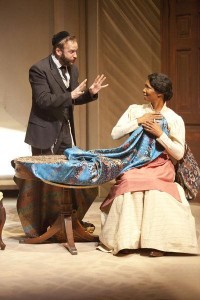 The ensemble is richly detailed and well-cast, but many of the portrayals are lost in a cavernous production which seems ill-suited to the proceedings. John Iacovelli’s set design includes draping of airy fabric, evoking mosquito netting and the sumptuous textiles used in Esther’s profession, and the individual scenes are represented by a few furnishings, most of which are opulent, but we never get a sense of Esther’s poor rooming house or Mrs. Van Buren’s affluent mansion. Epps gives his actors huge playing areas as well, which makes it seem that everyone lives comfortably. As such, the set seems out of place with the costumes, historically accurate and gorgeously rendered by Leah Piehl.
The ensemble is richly detailed and well-cast, but many of the portrayals are lost in a cavernous production which seems ill-suited to the proceedings. John Iacovelli’s set design includes draping of airy fabric, evoking mosquito netting and the sumptuous textiles used in Esther’s profession, and the individual scenes are represented by a few furnishings, most of which are opulent, but we never get a sense of Esther’s poor rooming house or Mrs. Van Buren’s affluent mansion. Epps gives his actors huge playing areas as well, which makes it seem that everyone lives comfortably. As such, the set seems out of place with the costumes, historically accurate and gorgeously rendered by Leah Piehl.
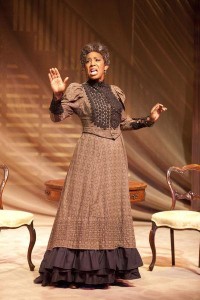 The director handily elicits wonderful work from his cast, but I wish he had a mid-size house in mind for this show, not Broadway. Perhaps this is why Steven Cahill’s peculiar sound design exists: the use of Scott Joplin rags, so closely associated with the movie The Sting, is too familiar; Mayme’s piano playing sounds like it emanates from a huge speaker backstage, not the piano; and the actors’ vocal levels are uneven. Most frustrating is Mr. St. Louis’ thick, impenetrable accent; with a performance this powerful, it’s a shame that easily one-third of his dialogue is undistinguishable.
The director handily elicits wonderful work from his cast, but I wish he had a mid-size house in mind for this show, not Broadway. Perhaps this is why Steven Cahill’s peculiar sound design exists: the use of Scott Joplin rags, so closely associated with the movie The Sting, is too familiar; Mayme’s piano playing sounds like it emanates from a huge speaker backstage, not the piano; and the actors’ vocal levels are uneven. Most frustrating is Mr. St. Louis’ thick, impenetrable accent; with a performance this powerful, it’s a shame that easily one-third of his dialogue is undistinguishable.
At the center of the production is the classy Ms. Williams, who takes a rather fundamentally simple character and elicits our empathy with a grounded performance of towering vulnerability. Mr. Smith, as the Jewish cloth merchant, stands out as never having a false moment’”the struggle between his faith and his heart is palpable. Dawnn Lewis gives a broader performance than the rest of the cast as Esther’s no-nonsense landlady, which works on its own but seems incongruent with the others. Because the ending is somewhat predictable, the engaging actors do hold our attention, but ultimately this is a patchwork production: if patrons notice the quilt as a whole, it will be a far more satisfying experience than inspecting each individual panel.
photos by Jim Cox
Intimate Apparel
Pasadena Playhouse
scheduled to end on December 2, 2012
for tickets, call 626.356.7529 or visit http://www.PasadenaPlayhouse.org
